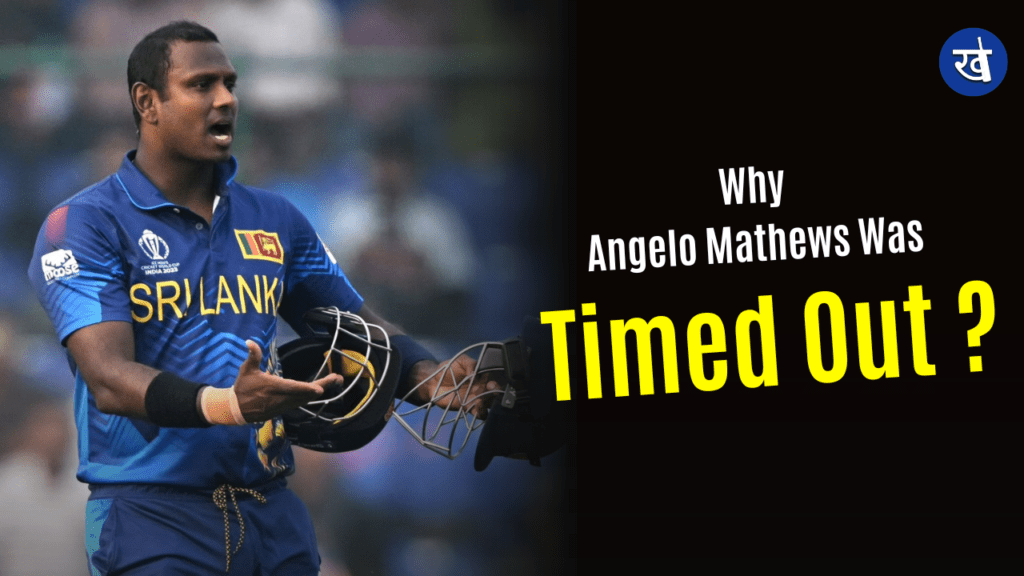
Cricket is a fascinating and fun sport loved by many around the world. It’s all about batsmen, bowlers, and fielders trying to outsmart each other. But in a recent cricket match between Sri Lanka and Bangladesh during the World Cup, something really unusual happened. Angelo Mathews, a Sri Lankan player, got himself “timed out,” and that’s a first in international cricket! So, what does “timed out” mean, and why did this happen to Mathews? Let’s break it down.
What is “Timed Out”?
In cricket, when a batsman gets out, it’s a big deal. There are various ways a batsman can be dismissed, like getting caught, bowled, or even run out. But “timed out” is quite unique. According to the rules of the ICC Men’s Cricket World Cup 2023, a batsman must be ready to face the next ball within two minutes after a wicket falls or a batsman retires. If they take longer than that, they can be declared “timed out.” It means they were too slow to get ready, like taking too much time to put on their gear or walk to the pitch.
Mathews’ Helmet Trouble
Now, let’s dive into the specific incident involving Angelo Mathews. He was the sixth batsman for Sri Lanka, and when he came in to bat, he had a problem with his helmet strap. Imagine if you were about to play, and your shoelaces came undone – that’s sort of what happened to Mathews. He needed to fix his helmet strap before he could face the bowler.
Also Read- 5 Indian Players To Watch Out In Cricket World Cup
Here’s where the trouble began. As Mathews was adjusting his helmet, the opposing team, Bangladesh, thought he was taking too long. They appealed to the umpires, asking for Mathews to be declared “timed out.” The umpires agreed with their appeal, even though Mathews was trying to sort out his helmet issue. This made Mathews really upset, and he had to leave the field without even facing a single ball.
ICC Rules Override
It’s important to note that the rules of the ICC World Cup take precedence over the standard cricket laws from the MCC (Marylebone Cricket Club). In this case, the ICC rules state that a batter must be ready to face the ball within two minutes. The TV umpire monitors this time, and if the batter doesn’t meet the requirement, they can be declared “timed out.” This is why Mathews was sent back to the pavilion even before the strap on his helmet broke.
Could Equipment Failure Be Considered?
You might wonder if the broken helmet strap was the real problem. According to the rules, a batsman must make sure all their equipment is in order before stepping onto the pitch. It’s not just about being prepared to face the ball; it’s about making sure everything is ready to go within two minutes. So, even if your gear isn’t working correctly, you’re still expected to be on the field and ready to play.
Also Read- ‘Me And Mahi Are Not Close Friends’: Yuvraj Singh Opens Up About His Relationship With MS Dhoni
Historical Context
This incident involving Angelo Mathews is a first in international cricket. There have been only six instances of batters being timed out in first-class cricket, which is a level of cricket played below international matches. So, it’s a very rare event.
In the past, there was a similar situation involving Sourav Ganguly in a Test match back in 2007. He took more than six minutes to step onto the field, but the opposing team decided not to appeal, so he got lucky. But, Sachin Tendulkar couldn’t bat in a similar situation, and VVS Laxman was believed to be in the shower, so Ganguly had to rush out to bat at No. 4 unprepared.
Also Read- What Is The DLS Method And How Does It Work?
In cricket, every second counts, and that’s why the rules about being ready within two minutes are so important. So, there you have it. Angelo Mathews’ “timed out” incident is a rare occurrence in international cricket, but it’s a good reminder of how important it is for batsmen to be quick and ready to play as soon as they step onto the field. Cricket is not just about hitting and bowling, it’s also about following the rules and being ready for the game!